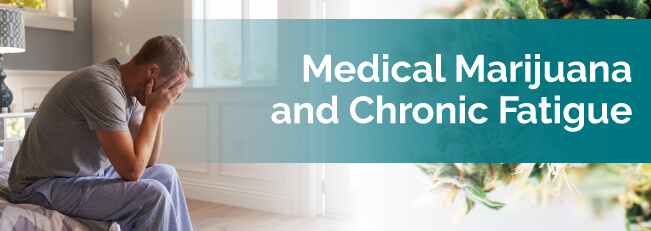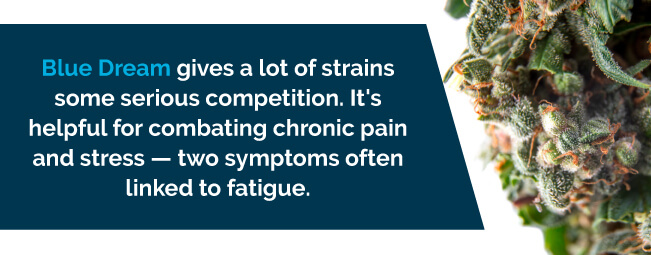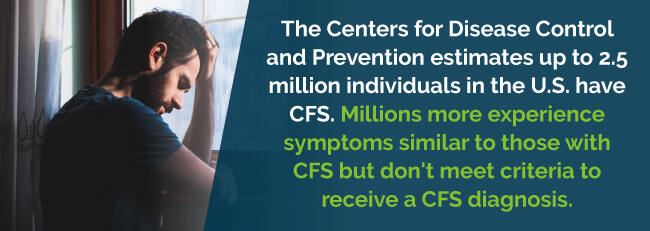
When you struggle with chronic fatigue syndrome, cannabis can help with your symptoms. There are plenty of strains of medical marijuana for chronic fatigue for you to choose from depending on the symptoms most affecting you.
Although there haven’t been many clinical trials or empirical studies on medical cannabis for chronic fatigue specifically investigating its ability to improve symptoms of ME/CFS, many patients who live in states that approve medical cannabis report experiencing relief from their symptoms for certain qualifying conditions.
Unrefreshing or disturbed sleep, muscle and joint pain, emotional imbalance and depression are all CFS symptoms medical cannabis can offer relief from. Some patients report marijuana even improves their main symptom of fatigue. Most report this was due to using Sativa-dominant strains because of their energizing effects.
Find A Doctor Find A Dispensary
Although traditional treatments can be successful at relieving some symptoms of CFS, they may also cause their own adverse side effects. Cannabis and chronic fatigue treatment not only helps ease your CFS symptoms but also the side effects of the treatments. Some side effects of CFS medical weed can help with include the following.
There are numerous studies showing cannabis improves poor sleep. They demonstrate even with reduced REM sleep, marijuana increases deep sleep, which leads to greater levels of refreshment overall.
Another well-established fact about cannabis is its ability to improve chronic pain. Studies have demonstrated medical pot’s ability to improve all types of pain, including neuropathic caused by dysfunction or injury of the nerve or nociceptive caused by other factors than nerve injury, such as inflammation in nearby tissue or wound.
Other studies have shown marijuana’s effectiveness in treating cognitive impairment and depression depending on the regularity of use, dose and environmental and genetic factors.

Often individuals may experience fatigue due to one or more medications they’re already taking for a different medical condition. For instance, steroids, antidepressants and sedatives may all lead to varying levels of fatigue.
Other symptoms marijuana for chronic fatigue helps with include:
The best approach in treating fatigue is to determine the underlying problem leading to it and treating it accordingly. In general, Sativa-dominant hybrid and Sativa strains are best for fatigue because of their energizing and mentally stimulating effects. Some strains specifically for treating CFS include the following.
As a supreme, award-winning marijuana strain, Super Silver Haze has been around for a long time. It gives you an energizing boost to knock your fatigue away.
An incredible energy-boosting Sativa strain, Jack Herer is useful for patients who suffer from fatigue, anxiety and depression.
Green Crack gives the precise amount of energy your body requires to get you through the day, but doesn’t keep you up at night. Patients use it for a variety of reasons, including anxiety, depression, stress and fatigue.
Blue Dream gives a lot of strains some serious competition. It’s helpful for combating chronic pain and stress — two symptoms often linked to fatigue.

This is a classic strain excellent at removing physical and mental pain. It’s effective at treating depression, pain, stress, anxiety and fatigue.
Although smoking is a popular method of consuming your medical marijuana for chronic fatigue, it’s not the only way. You have a whole range of methods available to you to consume your medical weed.
While you can’t simply throw a bud into a pot of boiling water to brew weed tea, it’s possible to brew weed tea. Because of this, many people have even come up with ways to make weed soda and weed beer.
Like any other medication, you can take medical pot in pill or capsule form. Capsules are much more potent and concentrated, so be sure you know the exact dose before taking them.
Dab is also called wax, or BHO (Butane Hash Oil). Dabs are strong hash oil extracts you smoke with a bong or other type of rig.
Cannabis tinctures are extracts drawn from the cannabis plant and are easy to manage and highly potent. You take them under your tongue. They start working about as quickly as smoking but without the smoke.
Sprays are tinctures you put into a spray bottle. They’re convenient, quick, effective and discreet — just a quick spritz in your mouth and you’re done.
Vapes heat up the cannabis to where the psychoactive materials become active but with no smoke. Vaping is better for your lungs, too.
Edibles are a popular method many patients favor. They’re a delicious way of consuming your medical cannabis.
If you’re looking into trying marijuana and chronic fatigue treatment, you’ll need to talk with a doctor first since different states have different legislative policies on pot.
If you are looking for medical marijuana appointments, laws and research for all legal states, MarijuanaDoctors.com makes it easy for you to start the process of finding qualified physicians. Be sure to browse our list of dispensaries or locate a medical marijuana doctor to get started with your cannabis treatment.
Find A Doctor Find A Dispensary
Chronic fatigue syndrome (CFS) is a complex condition characterized by severe fatigue doctors can’t explain from any underlying medical disorders. With CFS, your fatigue doesn’t improve when you rest and can get worse with both physical and mental activity.
CFS symptoms often start suddenly. Some individuals may develop their symptoms over weeks or months. Your symptoms may vary during the day, or they can change from one week to the next. They may go into remission (stop) and then relapse (start again). The term for this is myalgic encephalomyelitis (ME), often abbreviated as ME/CFS.
There’s no known cause of chronic fatigue syndrome, although there are plenty of theories, ranging from psychological stress to viral infections. Some experts believe a combination of factors can trigger CFS.
CFS isn’t a new condition. Nervous exhaustion (neurasthenia) was a name used in the 19th century for symptoms resembling chronic fatigue syndrome. Between the 1930s and 1950s, the U.S. and other countries reported outbreaks of the condition with noticeable prolonged fatigue. Reports in the U.S. and other nations of separate outbreaks of prolonged, debilitating fatigue revived interest in CFS in the early to mid-1980s.
There is an expansive range of chronic fatigue syndrome symptoms. However, just about everyone with CFS experiences some common symptoms:
With CFS, you may also have two or more of the symptoms below:
Chronic fatigue syndrome may also cause the following symptoms. You may experience them separately or have a combination of them. These symptoms include:
These are the main symptoms of CFS. Everyone experiences them in different ways.
Individuals with CFS come across as hypersensitive to even average amounts of activity and exercise. It’s still unknown why this occurs in some individuals but not others. Some may be predisposed to the condition since birth, which then triggers a combination of factors such as:
Researchers are still looking into this.
It’s common to have depression along with chronic fatigue syndrome — and your low spirits can make your symptoms of CFS worse. CFS and depression can cause you extreme fatigue, even after you’ve had a good night’s sleep the night before. You can also have both conditions simultaneously and mistake fatigue as being an effect of either one.
When you experience depression, you feel anxious, sad or hopeless for a prolonged period. Sleep problems are quite common with depression, where you’ll either not sleep at all or sleep too much.
Many individuals with CFS report cognitive impairment as their chief and most incapacitating symptom — even over fatigue. Other effects you may experience include problems with attention, memory, processing speed, word-finding abilities and language comprehension.

Chronic fatigue syndrome happens in all ages and both genders. It occurs in all ethnic and racial groups as well. The Centers for Disease Control and Prevention (CDC) estimates up to 2.5 million individuals in the U.S. have CFS. Millions more experience symptoms similar to those with CFS but don’t meet criteria to receive a CFS diagnosis. Also, according to the CDC, fewer than 20 percent of people with CFS in the U.S. have received a CFS diagnosis.
Facts reported by the National Center Biotechnology Information (NCBI) reveal:

Changing certain harmful habits in your lifestyle may help decrease the symptoms you experience. For instance, you can ease your insomnia and sleep by reducing or eliminating caffeine. Limiting your alcohol and nicotine intake can help too. Avoiding daytime naps, creating a regular sleep routine, going to bed each night at the same time and waking up each morning at the same time are all things you can do to help with chronic fatigue.
It’s also a good idea to pace yourself while performing activities. Your symptoms may get worse with overexertion and induce an episode of fatigue. Schedule time in each day for relaxing or taking part in activities you enjoy, and avoid physical and emotional stress.
Besides lifestyle changes, several other treatment methods for CFS include therapy, medications, alternative medicine and medical marijuana.
There are two types of therapy you might benefit from. Your doctor can help you decide if GED or psychological counseling are safe options designed to benefit you:
You have a better chance of successful therapy treatment if you meet the following criteria:
Usually, one medication won’t be enough to treat all the symptoms you encounter. You may experience changes in your symptoms over time, and your CFS could trigger depression or be part of it. If this happens to you, you may require an antidepressant along with other medications.
Side effects of most antidepressants include:
If changing your lifestyle isn’t enough for you to get good sleep at night, your physician may advise you take a sleep aid. They may also recommend you take a pain-relieving medication for any joint aches and pain related to your CFS. Side effects of most pain relievers, depending on the type of pain reliever, include:
Alternative treatments such as tai chi, massage, acupuncture and yoga may help relieve your CFS-related pain. Before you begin any alternative therapies, consult with your doctor.